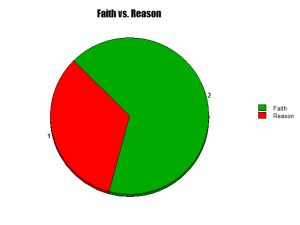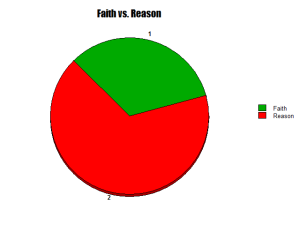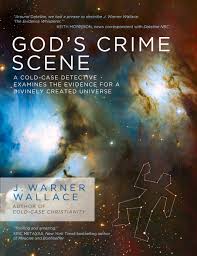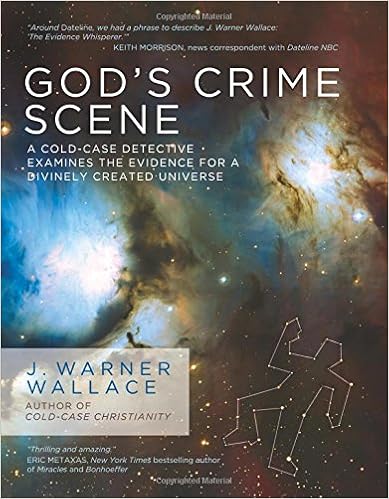Many different arguments can be used to demonstrate that God does actually exist. Individually, these arguments are compelling, and I believe when brought together, they make a very strong case, indeed. I want to go through a few of them with you. These are, of course, not original with me, and much more has been said about each of them, but I hope to explain in an easy-to-understand way the intuitive and powerful nature of these arguments.
Causes and Beginnings
Genesis 1:1 – “In the beginning, God created the heavens and the earth.”
To start with, let’s look at an argument about the beginning of the universe, called the Kalam Cosmological Argument. Reasonable Faith has put together several great videos presenting these arguments, and so I want to start with one of them. Have a look:
The Kalam Cosmological argument goes like this:
- Everything that begins to exist has a cause.
- The universe began to exist.
- Therefore, the universe has a cause.
This is a deductive argument, and it is in a valid form, so the task is to examine the premises to see if they are true, and so show the conclusion as also being true.
The first premise, “Everything that begins to exist has a cause,” matches our uniform and repeated experience in everything in life and science. To deny this is to say that some things could spontaneously come into existence with no cause and no reason; there is a rather large burden of proof on the one who would want to assert this counter-intuitive claim. An overthrow, or even an exception to the foundational principle of causation would create a massive undermining of the process and understanding of the scientific endeavor. I simply have not seen any convincing arguments or alternative explanations for the tried-and-true principle of causation that we adopt as the first premise.
Secondly, “the universe began to exist” matches the evidence of modern scientific observation, and is the best explanation of the evidence. But let’s consider some alternative theories that have been suggested.
- The steady state theory says that the universe has existed in stasis for eternity past. Cosmological observations and discoveries have rendered this theory obsolete, as there is data that shows the universe is expanding outwards from a central point.
- Another theory attempts to modify and salvage the steady state theory by postulating a continuous expansion, in which the universe is and has eternally been expanding, and that as it does so, new matter comes into existence from that central point. But this theory seems rather implausible as well, as (referring back to the first premise) our uniform and repeated observation and experience tells us that nothing begins to exist without a cause. Some sort of reasonable mechanism would need to be proposed and explained to redeem this theory, and none exist.
- Another model, the oscillating universe theory, suggests that our universe eternally, past and future, oscillates between cycles of expansion and contraction in which the gravitational forces in the universe cause the universe to collapse back in upon itself, after which it will expand back out. In this proposal, we are observing the universe presently in one of the expansion cycles. The problem here is that the force of gravity is not strong enough to pull all the universe back together; a collapse is not possible through this means. It appears we have a one-way expanding universe.
Therefore God?
It seems that we cannot escape the conclusion that the universe has a cause. How does this help our case for God’s existence? As I said in the last post, we are taking baby steps here. I won’t assert that this proves Christian theism, but I do think it provides some good evidence that is hard to ignore. Some of the properties of the causal agent of the universe would include these:
- Uncaused – the “first cause” must be uncaused or else it would not be the first cause; something beyond would have caused it, into an infinite regress of absurdity.
- Exceedingly Powerful – even omnipotent, to cause the universe to exist from literally nothing
- Personal – only a personal agent with will, intent, and consciousness can explain the beginning of the universe with no prior causes.
I believe there are more attributes we could infer from this argument, but again, I want to be modest and not stretch out beyond our reach. These three attributes are certainly God-like as described in the Bible, and as we go on, we’ll see that the other arguments will bring us even closer to the God of Christian theism.
In the next post, I will briefly discuss some objections that may be raised to the cosmological argument and address my views on the age of the universe, another implication of this argument.
Comments, questions, challenges? Email me through the form on my “about” page, we’ll discuss, and your comments may inspire a follow-up post!
(All Scripture in this post is from the ESV translation)

 conclusions about the world around us. We saw the first principles of logic that form the foundation of reason, and that true, biblical faith is based on reason, rather than being opposed to it, as some misunderstand. Building on this, let’s now look at the most common types of arguments: deductive, inductive, or abductive.
conclusions about the world around us. We saw the first principles of logic that form the foundation of reason, and that true, biblical faith is based on reason, rather than being opposed to it, as some misunderstand. Building on this, let’s now look at the most common types of arguments: deductive, inductive, or abductive. to show they are complimentary, not opposites.
to show they are complimentary, not opposites.



 members of the first three categories were insufficient of themselves to provide adequate basis of belief. Only when we begin with a properly functioning mind can we correctly appraise truth claims presented by the society, psychology, and religion.
members of the first three categories were insufficient of themselves to provide adequate basis of belief. Only when we begin with a properly functioning mind can we correctly appraise truth claims presented by the society, psychology, and religion.

 and I’m going to try to hit several in a less exhaustive treatment than the last. Most of them are more easily dispensed with anyhow.
and I’m going to try to hit several in a less exhaustive treatment than the last. Most of them are more easily dispensed with anyhow.
 Christian Apologetics involves making a reasoned defense of the things we believe as Christians. In the last several posts, I’ve tried to give you good reasons, both biblical and pragmatic, why every Christian ought also to be a good case-maker. However, some Christians think the Bible actually teaches the opposite, that apologetics actually goes against biblical mandates. Since I’ve made a biblical case previously, and a biblical case is being raised to show the opposite, we must carefully consider each and decide which is the most accurate and true.
Christian Apologetics involves making a reasoned defense of the things we believe as Christians. In the last several posts, I’ve tried to give you good reasons, both biblical and pragmatic, why every Christian ought also to be a good case-maker. However, some Christians think the Bible actually teaches the opposite, that apologetics actually goes against biblical mandates. Since I’ve made a biblical case previously, and a biblical case is being raised to show the opposite, we must carefully consider each and decide which is the most accurate and true.
